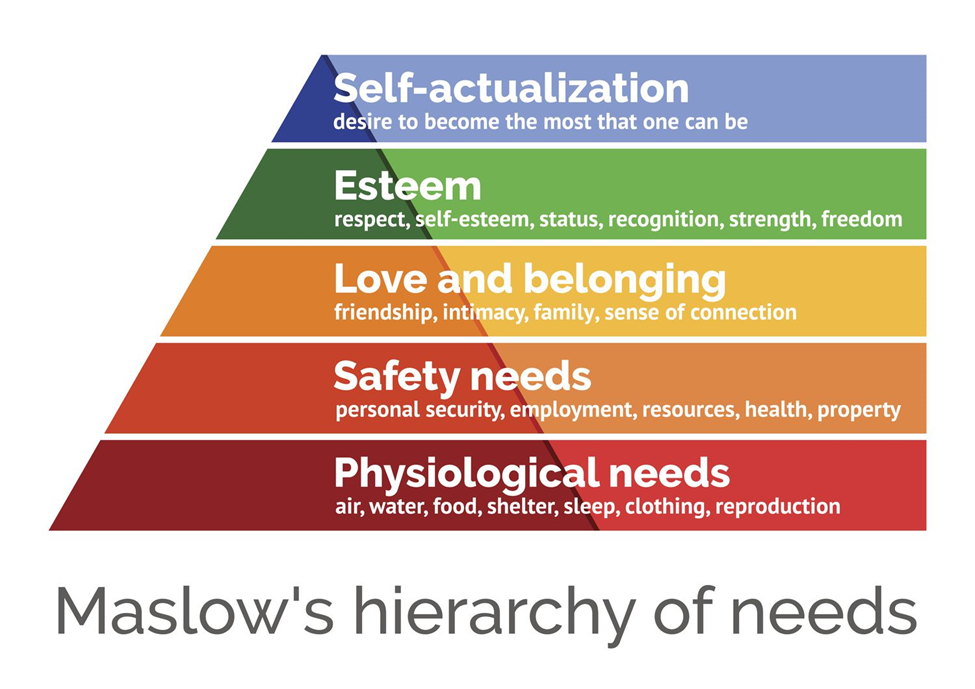A nurse uses Maslow's hierarchy of needs to plan care for a client with psychosis. Which problem will receive priority?
Needs to be taught about medication action and side effects.
Refuses to eat or bathe.
Is reluctant to participate in unit social activities.
Reports feelings of alienation from family.
The Correct Answer is B
A. Needs to be taught about medication action and side effects: This problem relates to the client's need for information and understanding about their medication regimen, including its action and potential side effects. While education about medication is important, it may not be the top priority when considering Maslow's hierarchy of needs.
B. Refuses to eat or bathe: This problem directly impacts the client's physiological needs for food and hygiene, which are foundational in Maslow's hierarchy. Therefore, addressing the client's refusal to eat or bathe would take priority over other concerns.
C. Is reluctant to participate in unit social activities: This problem pertains to the client's social and emotional needs, which are higher-level needs in Maslow's hierarchy. While social activities can contribute to the client's well-being, they are not as critical as addressing immediate physiological needs.
D. Reports feelings of alienation from family: This problem relates to the client's sense of belongingness and love, which are also higher-level needs in Maslow's hierarchy. While addressing feelings of alienation is important for the client's overall well-being, it is not as urgent as addressing physiological needs.

Nursing Test Bank
Naxlex Comprehensive Predictor Exams
Related Questions
Correct Answer is B
Explanation
A. Needs to be taught about medication action and side effects: This problem relates to the client's need for information and understanding about their medication regimen, including its action and potential side effects. While education about medication is important, it may not be the top priority when considering Maslow's hierarchy of needs.
B. Refuses to eat or bathe: This problem directly impacts the client's physiological needs for food and hygiene, which are foundational in Maslow's hierarchy. Therefore, addressing the client's refusal to eat or bathe would take priority over other concerns.
C. Is reluctant to participate in unit social activities: This problem pertains to the client's social and emotional needs, which are higher-level needs in Maslow's hierarchy. While social activities can contribute to the client's well-being, they are not as critical as addressing immediate physiological needs.
D. Reports feelings of alienation from family: This problem relates to the client's sense of belongingness and love, which are also higher-level needs in Maslow's hierarchy. While addressing feelings of alienation is important for the client's overall well-being, it is not as urgent as addressing physiological needs.

Correct Answer is C
Explanation
A. Gamma-aminobutyric acid (GABA) and acetylcholine: GABA is an inhibitory neurotransmitter that helps regulate neuronal excitability. It is not typically implicated in depression. Acetylcholine plays a role in cognitive functions and muscle contractions but is not primarily associated with depression.
B. Glutamate and histamine: Glutamate is the primary excitatory neurotransmitter in the central nervous system, and its imbalance has been linked to various neurological disorders, but it is not directly implicated in depression. Histamine, known for its role in allergic responses and wakefulness, is not typically associated with depression.
C. Norepinephrine and serotonin: Both norepinephrine and serotonin are monoamine neurotransmitters that play crucial roles in mood regulation. Decreased levels of these neurotransmitters have been strongly linked to depression. Norepinephrine is involved in the body's stress response and arousal, while serotonin is involved in mood, sleep, appetite, and other functions.
D. Serotonin and acetylcholine: Serotonin, as mentioned earlier, is significantly implicated in depression due to its role in regulating mood and emotional states. Acetylcholine, while important for cognitive functions and muscle control, is not primarily associated with depression.
Whether you are a student looking to ace your exams or a practicing nurse seeking to enhance your expertise , our nursing education contents will empower you with the confidence and competence to make a difference in the lives of patients and become a respected leader in the healthcare field.
Visit Naxlex, invest in your future and unlock endless possibilities with our unparalleled nursing education contents today
Report Wrong Answer on the Current Question
Do you disagree with the answer? If yes, what is your expected answer? Explain.
Kindly be descriptive with the issue you are facing.
